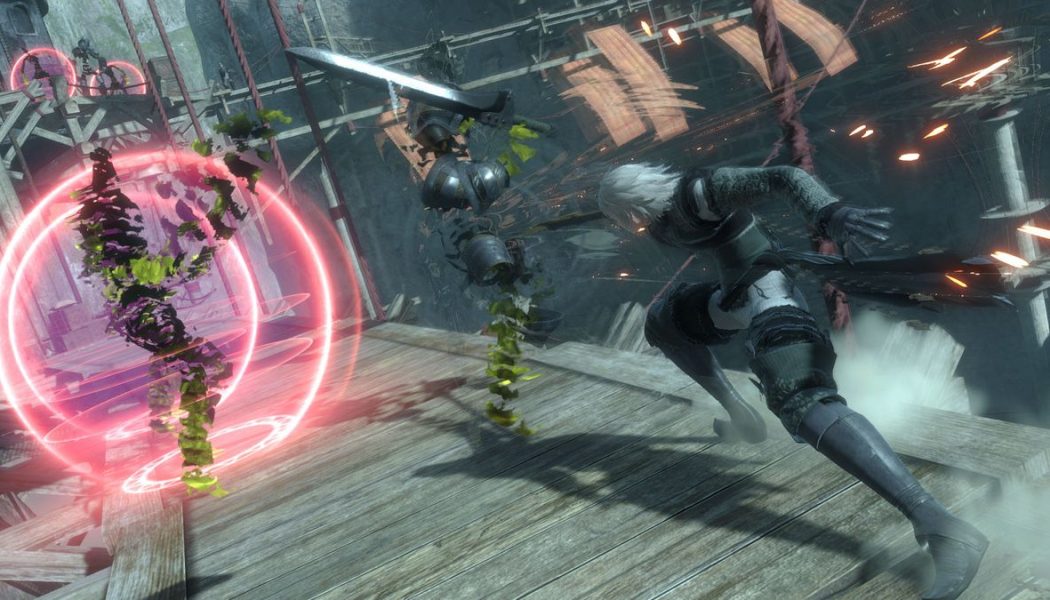Nier: Automata wasn’t expected to be a hit. It was a sequel to an RPG that could charitably be described as a cult classic, and its time-spanning story demanded a lot from players. Yet director Yoko Taro’s dark, poignant, and hilarious writing shone through, while the developers at PlatinumGames ensured the action felt great. It ended up selling more than 5 million copies, was ported to new platforms, and most recently was introduced to a brand-new audience through Xbox Game Pass. That makes now the ideal time to dig into its predecessor — which just so happens to be getting a remaster later this month.
The first Nier launched in Japan in 2010, and it was actually split into two versions: the main game on PS3, called Replicant, and Gestalt for the Xbox 360, which starred an older lead that Square Enix hoped would better appeal to Western audiences. The game was praised for its cryptic story and creative worldbuilding, but it also received plenty of complaints about dated graphics and clunky controls. The result was that it never really caught on with a big audience. And that’s where the new version — officially titled Nier Replicant ver.1.22474487139… — comes in.
Replicant appears to make the PS3 version the canonical story, and it’s centered on a brother who has to traverse a post-apocalyptic landscape in search of a cure for a mysterious disease that is slowly killing his sister. (It also takes place thousands of years before Automata, so while there are connections, the stories stand alone pretty well.)
I didn’t play either of the original versions, so I can’t speak directly to the changes made. But after playing the first 12 hours, it’s giving me the same vibes as Automata. For one thing, it’s incredibly weird. You’re accompanied by a magic talking book that fires spears made from the blood of your enemies, and the game constantly shifts in unexpected ways; sometimes a dungeon involves fighting giant monsters; other times, it’s a text adventure full of riddles. Taro also loves to break the fourth wall, and Replicant does this in myriad ways, from complaints about sidequests to a sequence where characters talked directly to a narrator. This is a video game that doesn’t pretend to be anything else.
There’s also a sadness that will be familiar to fans of Automata. This is a story about death and loss, after all, punctuated by an incredible score from composer Keiichi Okabe. The muted color palette and world full of beautiful, crumbling ancient ruins only add to this feeling. There’s also a richness to what at first appears to be a fairly typical fantasy setting. Some of my favorite moments so far included visiting a desert town where its masked inhabitants live by a strict list of literally thousands of rules and learning how to communicate with them, or visiting a library and hearing people marvel at how much ancient civilizations used to write things down.
:no_upscale()/cdn.vox-cdn.com/uploads/chorus_asset/file/22411707/NieRReplicant_ver122_COMBAT1.jpg)
It also just feels great. Like Automata, the action is relatively simple but fast and satisfying. You can pull off incredible moves just by mashing the attack button and rolling around, while your book companion handles ranged attacks, almost like a gun-firing drone. It’s the kind of game where I don’t ever avoid battles because they’re so fun.
But that’s not to say it’s exactly like Automata. While the tone and gameplay are familiar, it is slightly clunky. The sidequests are full of interesting stories, but the ones I’ve played so far are pretty dull fetch quests. Running around collecting lizard tails is not a good time, no matter how beautiful the setting is. Similarly, while I love that the game tries new things, it doesn’t always work; the handful of frustrating platforming sequences are just one example. Replicant definitely isn’t as polished as its sequel, even in this new and updated form.
While the original Nier wasn’t a breakout success, it’s clear that developer Square Enix had faith in it. Back in 2017, just before Automata launched, producer Yosuke Saito told me: “We thought that we really needed to let this new [intellectual property] grow and get bigger.” After spending some time with Replicant, I understand why. Despite the rough edges, it’s a fascinating experience that I can’t wait to dig into even further — expect much more on the game later this month in my full review.
Nier: Replicant launches on April 23rd on the PS4, Xbox One, and Steam.










